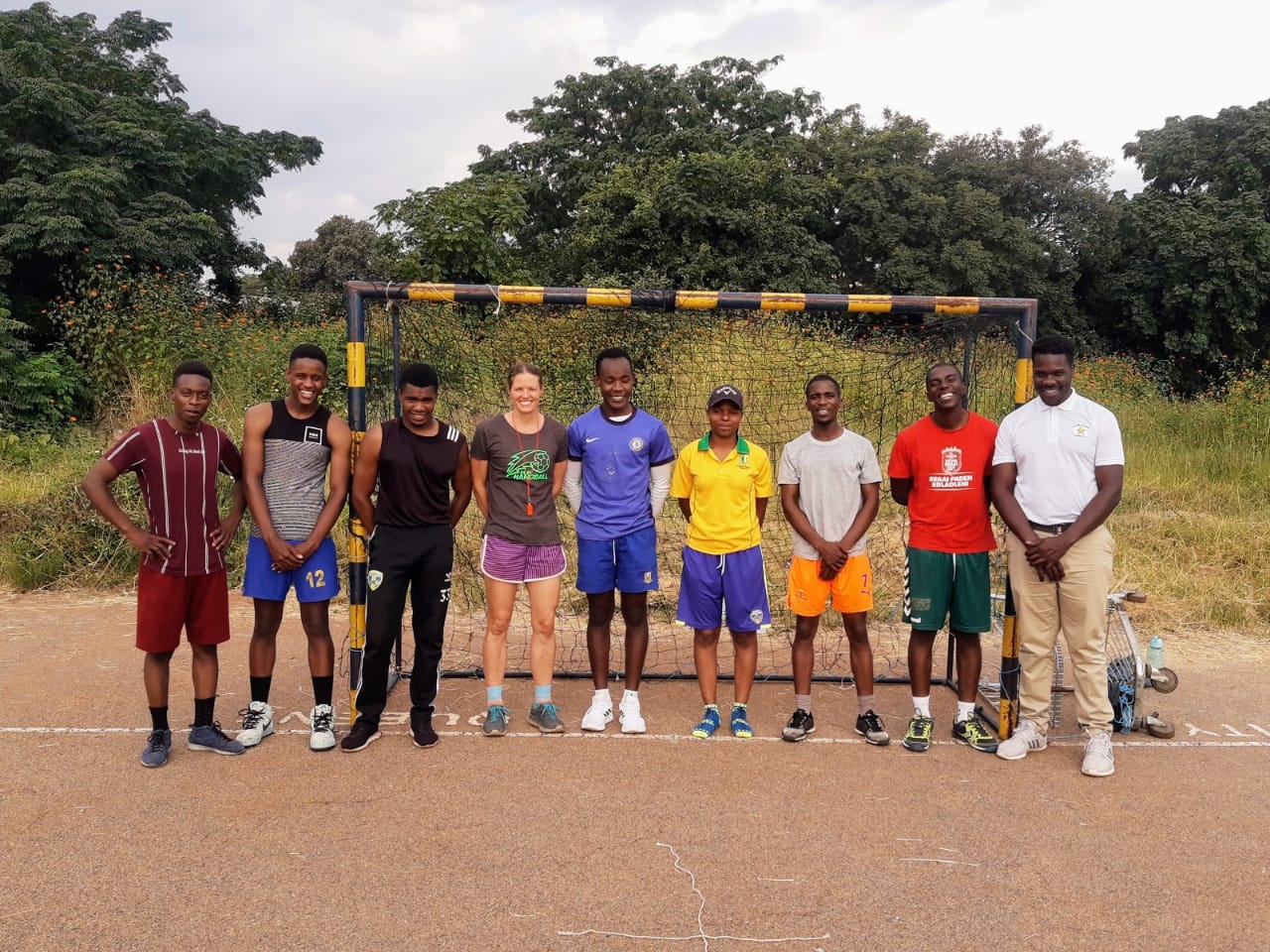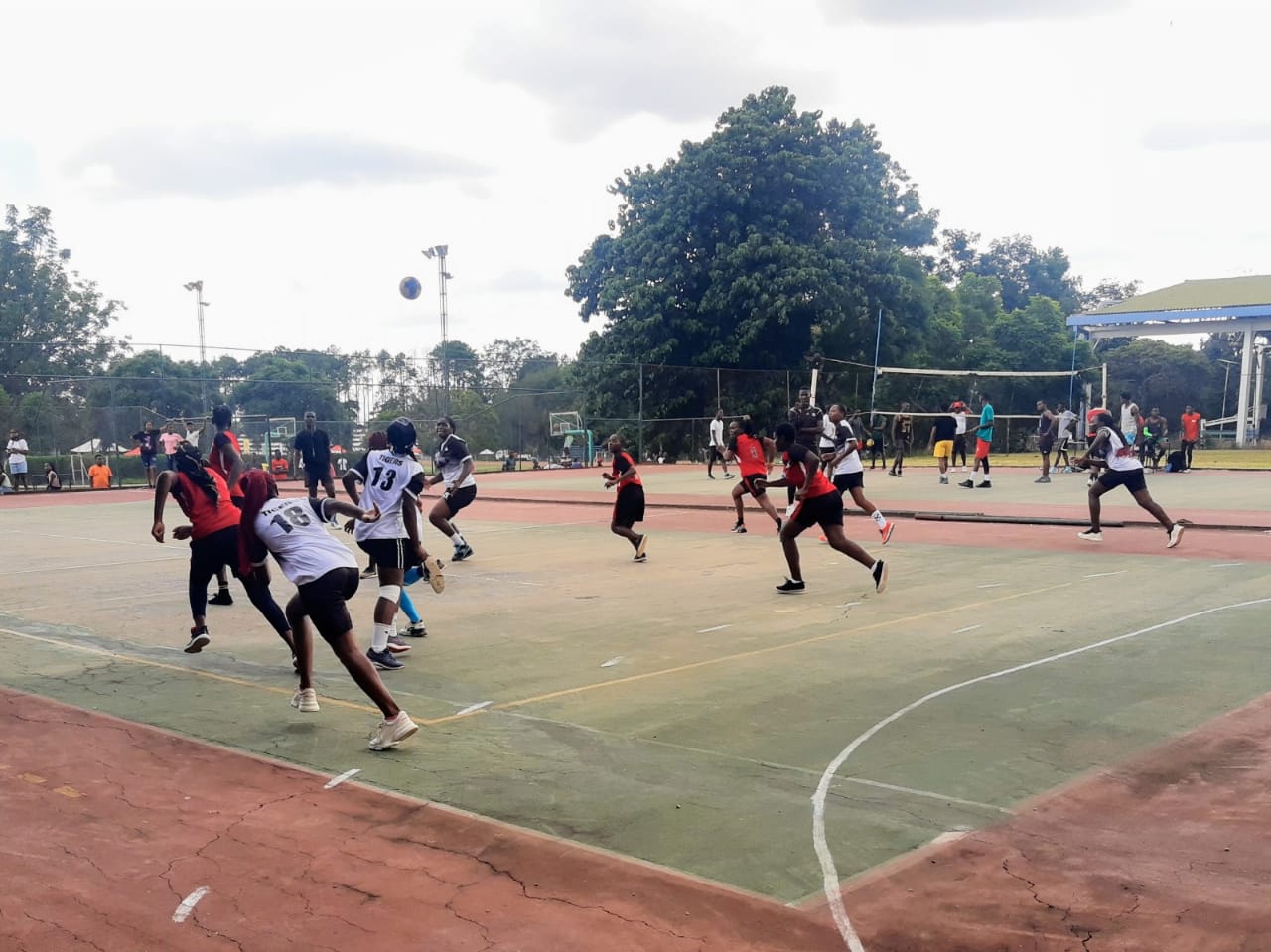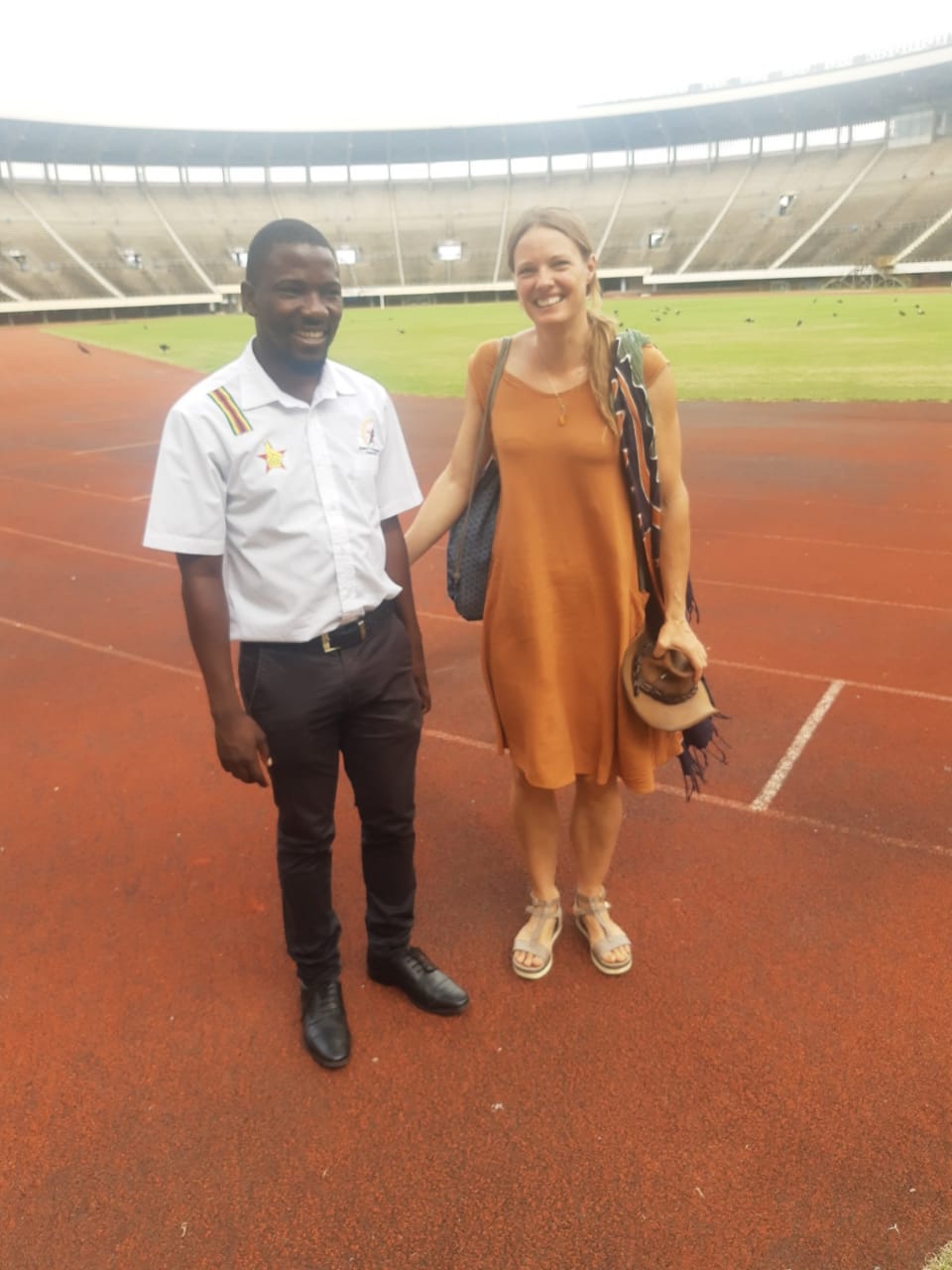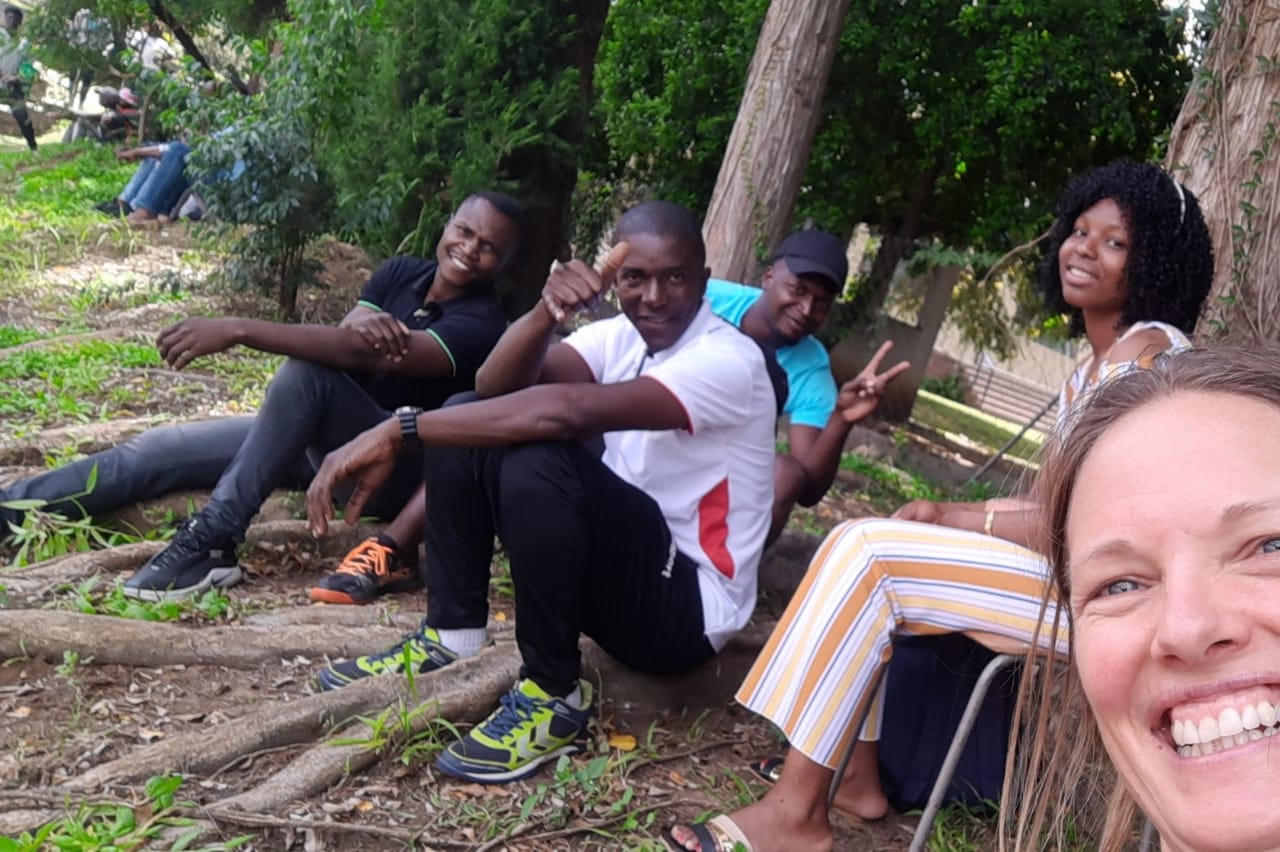6 weeks full of culture, people, public transport, handball and ugali (pap/maize meal).The month of March was a travel month for our founder and director Nicola. After a long break, it was time to visit our colleagues and project partners outside of South Africa again.
PLAY HANDBALL: Nicola, what was the purpose of your trip?
Nicola: The aim of this tour was to facilitate seminars with volunteers, meet existing and potential partners in the different countries and also meet with our team in Kenya to plan the way forward. I haven’t been to Kenya since the start of the pandemic in 2019. I was very excited to meet all the project partners again, meet my colleagues in Kenya in person and also see how the volunteers are doing in their projects.
PH: Your first stop was Gaborone. Tell us about the activities of Play Handball in Botswana.
Nicola: We started our first project in Botswana only last year. Vincent, Yamina, Leo and Lasse are assisting with handball development in the area of Mochudi. The volunteers are based at ‘The DOW Academy’, which is part of a cooperation project between the “weltwärts” organisation Jugend-im-Ausland and us. Beside facilitating a volunteer seminar in Rasesa, I met with Mr Kamanga, General Secretary of the Handball Federation in Botswana, to discuss challenges and opportunities for handball development in Botswana.
PH: And what is about the potential in your opinion for handball in Botswana?
Nicola: The federation is still young. They have been focusing on handball in correctional services and also some schools. The major challenge to develop the sport is the logistics between different clubs to organize competitions, but also the training of coaches and referees. Basically, a lot still needs to be built. Also, there is a gap in the infrastructure for indoor-handball. But the interest is there. In my opinion, that is the most important factor. If you have people who are willing to get involved and help. Then a sport can grow and develop, even if the conditions are not optimal. I can see that in the schools where we have introduced handball. The kids and the teachers love the “new” sport and opportunity to play and learn something different. At the moment, our volunteers are in contact with the federation and besides their tasks in the schools in Mochudi, they will help them with upcoming events.
PH: After Botswana, you travelled to Zimbabwe. Why Zimbabwe?
Nicola: There are many handball players in Cape Town who come from Zim. They have been asking for years that I should come and visit. We have also had participants from Zimbabwe in our online courses. Innocent, a coach and referee from Zimbabwe, invited me to come to Harare to show me the local handball community and discuss a proposal for a handball project with me and other partners. As I was on my way to Kenya, I took the opportunity to make a stopover in Zim and explore the country for myself.
PH: What is your view?
Nicola: Before I travelled to Zim, I often heard stories about corruption and bribes, but also how difficult it is to pay with the local currency. I was quite worried because I travelled by public transport. From Gaborone, I took the bus to Harare. So, I was not sure about the journey and the border crossing. But all went well. Apart from a long wait at the border because all the luggage had to be taken off the bus and checked by border control, the journey went smoothly. Yes, there might be a few procedures that you don’t see as a normal traveler, but nothing that bothered me. So, I just enjoyed the view of the landscape.
PH: Why did you decide to travel by bus? Isn’t that a long way?
Nicola: Yes, it is not just around the corner. The bus took over 20 hours to arrive in Harare. But my goal was also to get in touch with the people and see more of the country. Travelling by plane is more comfortable, but development and development work are not comfortable. It is often a long and arduous journey. If I am only in my office in Cape Town, I am too far away from the “real” project world. Travelling by bus, staying with a host family in Harare that I didn’t know before, using a bucket shower with mostly cold water, helps to ground oneself and also to understand the people in the country better. Basically, I put myself in the shoes of our volunteers. I really enjoyed it.
PH: What is a bucket shower?
Nicola: In industrialized countries like Germany, but also in most parts of South Africa, we are spoiled by a convenient life and running water. But in many places around the world, running water is still a luxury or the way bathrooms are designed is simply different. So, in some places, people use a bucket for showering. You have a bucket of water and a small cup to pour the water over your body.
PH: What else was Harare like?
Nicola: The people in Harare are friendly and helpful. I saw some nice handball matches and also coached a team from Harare City. The only thing that bothered me was the constant smell of burnt waste in the air. There is no real waste management system and plastic waste is burnt on every corner, in parks or private homes. When I see how the environment is polluted, it always makes me sad. Of course, I am aware that in some cases there is no established system or solution yet. Maybe we can address this problem in future projects with PlayHandball in Zim. We will see.
PH: So is there a future Play Handball project in Zimbabwe?
Nicola: We talked about possibilities. If the people in Zimbabwe are motivated to make a difference, I would be very happy if Play Handball could support them. We could share best practices and help promote handball for the benefit of children and youth in Zimbabwe.
PH: After Zimbabwe, you went to Kenya? Who did you meet there?
In Kenya I met with my colleagues Carol and Victor, as well as visited our partners and volunteers in the country. At the moment there are 5 volunteers from Germany in Machakos, Juja, Thika, Suswa and Kisumu.
PH: What was the highlight in Kenya?
Nicola: There was more than one highlight. First of all, reconnecting with my colleagues was very good. To meet in person is a more comfortable way to discuss and plan forward compared to online calls. Secondly, seeing how the volunteers are integrated in their local projects, how they connect with their host families and communities made me happy. It shows that the way we set up the projects is in general good. For sure, there are always challenges but nothing that can’t be solved. The mid-term seminar was another highlight, attending a Kenyan wedding and also a visit to some potential schools in Meru was really good. In Kenya, I travelled as well mostly by road. From Nairobi, to Suswa then to Kisumu and later to Meru. It is such a beautiful and busy country. On our way to the different locations, we passed fields of rice, tea, coffee, pineapples, bananas or just forest and baobab trees.
PH: Did you learn anything new about Kenya?
Nicola: I picked up some new Swahili words. In general, the visit just reinforced my view of Kenya as a country with good potential for handball, especially in schools and also the proactivity and hands-on mentality of people.
PH: And what is next?
Nicola: Back to South Africa. Wrapping up all the bits and pieces from the travels and working on our plans for more handball in schools in Kenya, South Africa and Botswana.
PH: Thanks a lot for your time and the nice chat.
Lasse – volunteer and social media coordinator by Play Handball





